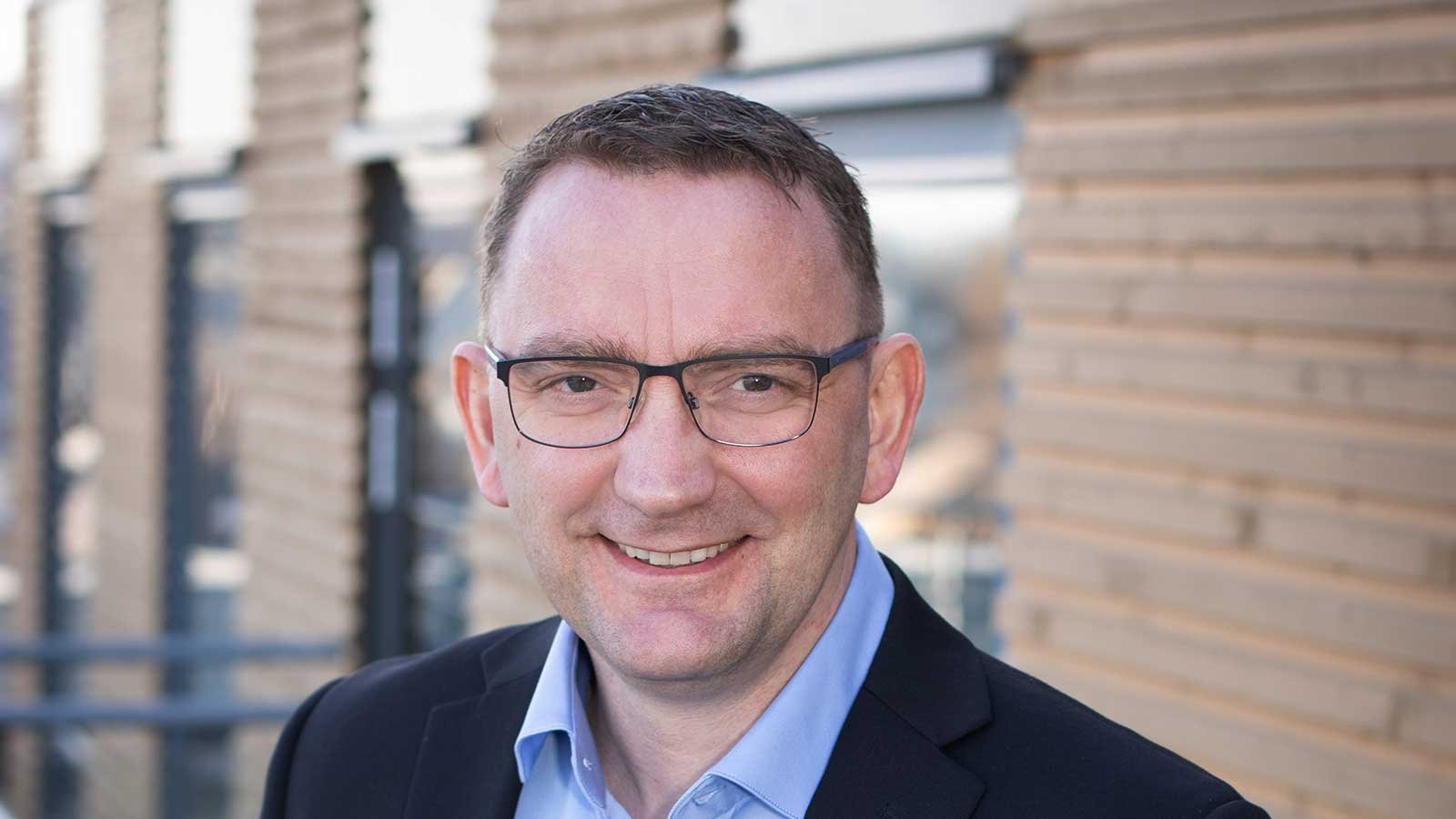Angelvik began his professional journey as a chef, earning his trade certificate in 1994. He co-edited the cookbook Matgleder fra Trøndelag in 2002, published by the Trøndelag Chefs Association, and established his own ventures in restaurant, catering, and cafeteria operations.
In 2015, he transitioned to full-time politics as State Secretary in the Ministry of Trade, Industry, and Fisheries. This background gives Angelvik valuable insight into the challenges faced by businesses and the need for collaboration with authorities.
Bridging the gap between politics and business
A central part of Angelvik’s work at BEWI Invest involves strengthening dialogue between the seafood industry and political decision-makers. He emphasizes that political risk is a significant challenge for Norwegian businesses.
– Norwegian businesses, particularly in the seafood sector, rely heavily on predictability and sound regulatory frameworks to grow and contribute to societal development, he explains.
As Chairman of the Board for Havbruksleverandørene, an organization representing technology and service suppliers across aquaculture, maritime, and oil and gas sectors, Angelvik works closely with politicians at both local and national levels.
– I often meet with decision-makers in Parliament and other important forums to provide insight into what’s happening in the industry. This is crucial for enabling them to make well-informed decisions that impact our sector, he says.
Angelvik stresses that the industry shouldn’t approach authorities merely to voice complaints or promote its own interests but should actively contribute to updating them on needs and opportunities.
– Storytelling is key. By sharing our story clearly and honestly, we create an understanding of what we do and why it matters, Angelvik asserts.
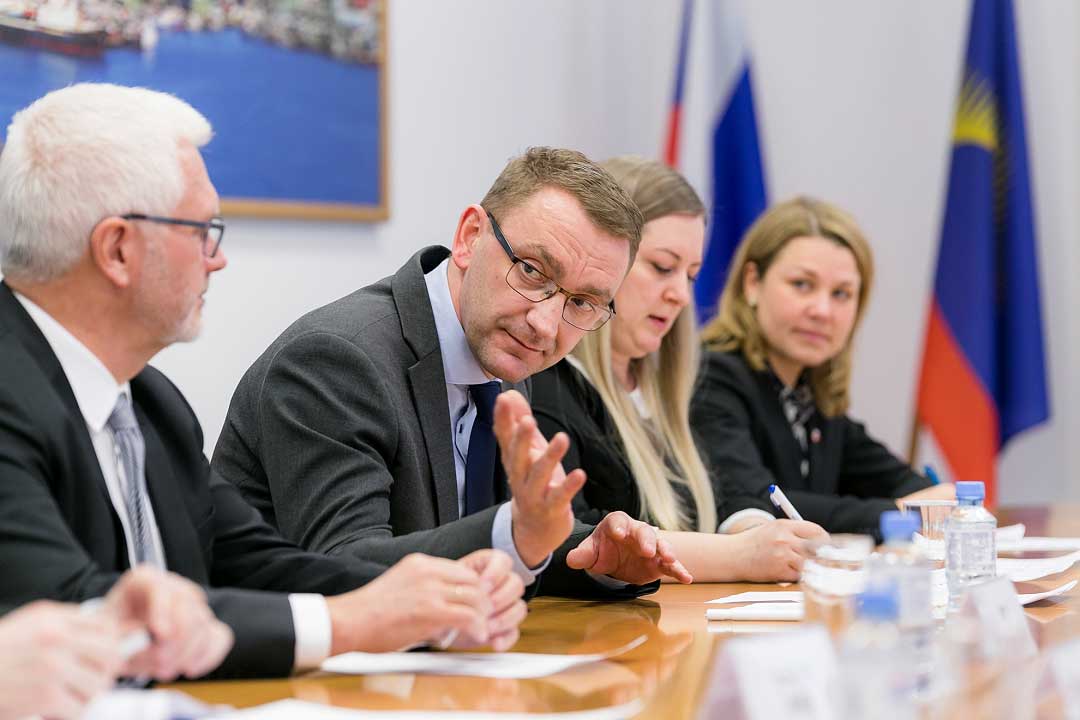
STATE SECRETARY: Roy Angelvik represents Norway in the signing of an important fisheries trade agreement in Murmansk, Russia.
Photo: Private
Prioritizing animal welfare and fostering knowledge exchange
Animal welfare is a top priority for Angelvik, who believes that fish should be at the center of all production efforts.
– We are involved in animal husbandry, and it is crucial that fish are treated in ways that meet their needs. Norway has unique expertise in this area, and we must continue to improve, he says.
To achieve this, Angelvik highlights the importance of collaboration and knowledge sharing, both within the industry and between the industry and authorities.
– Parliamentarians come from different parts of the country, and we can’t expect them to know the details of what we do. Therefore, we must invest time and resources in sharing knowledge, both with decision-makers and the broader public. Every company has a responsibility to demonstrate how they contribute to value creation, he explains.
Angelvik also underscores the importance of building pride and communicating the industry’s significance to Norway.
– Marit Bjørgen never apologized for winning gold, and we should stand tall as well. We must be honest, explain why we excel, what we do, and how we do it. It’s not about boasting; it’s about sharing our story, he elaborates.
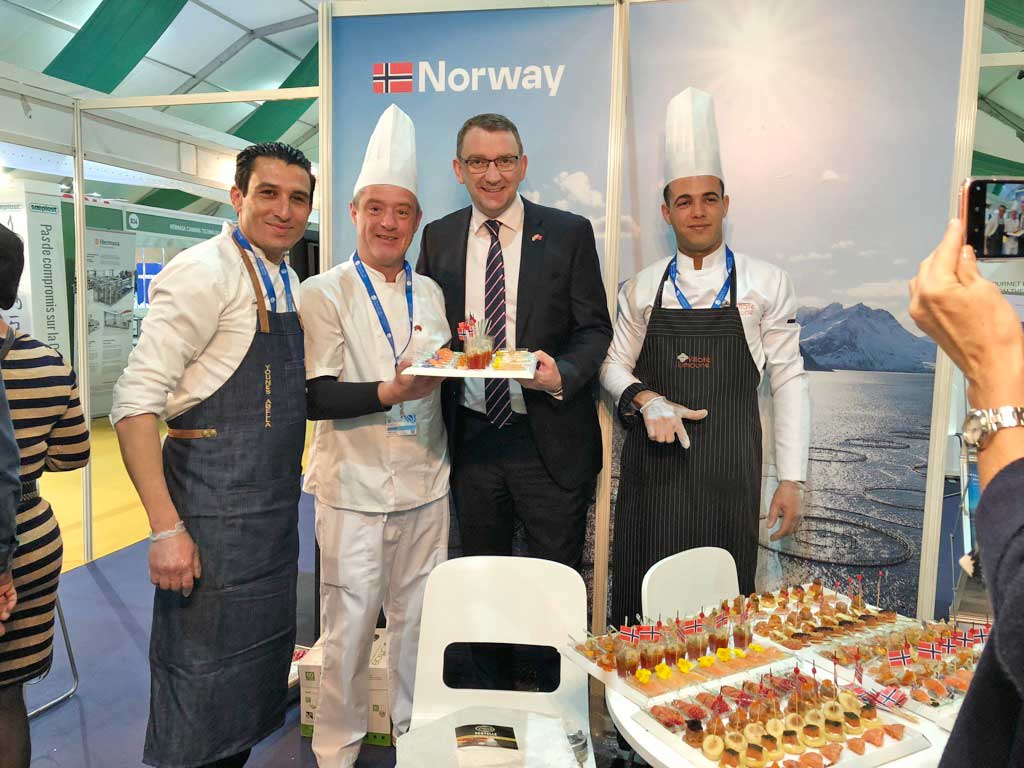
SEAFOOD FAIR: In his role as State Secretary, Roy Angelvik was often traveling. Here, he opens the seafood fair in Agadir, Morocco, in 2019 – an important part of promoting Norwegian seafood internationally.
Photo: Private
Reputation and historical roots
Another key focus for Angelvik is enhancing the seafood industry’s reputation. He notes that one-sided media coverage often creates a skewed perception of the industry.
– Headlines frequently revolve around multimillionaires, taxes, and heirs moving to Switzerland. This overshadows the positive values we create, such as jobs, schools, kindergartens, and sports facilities – results of growth and activity in local communities, he explains.
To counter this, Angelvik argues that the industry must take ownership of its narrative and invest in communicating it credibly and engagingly. This is essential for the industry’s ‘license to operate’ – society’s acceptance and understanding of why the seafood sector should be allowed to conduct its activities.
He cites BEWI as an example of effective storytelling:
– BEWI started on Frøya in 1980, producing 5,000 fish boxes annually. Today, we are a leading player in fish packaging and technology for sustainable seafood production. We’ve maintained pride and culture within the company, but now we’re also working to share this externally. We continuously share our story through social media, engaging journalists, and inviting politicians and schools, he says.
Angelvik draws parallels to agriculture, which is deeply rooted in Norwegian identity.
– People accept agricultural subsidies, oil extraction, and power production as necessities because they are part of Norwegian identity. In contrast, the seafood industry, which exports 98 percent of its production, often feels distant in everyday life. When people shop, they only see a product in the fish counter, rarely thinking about how it connects to our history and identity, he observes.
He points out that the seafood industry has focused too much on production and value creation without recognizing the importance of conveying its roots and significance.
– Historically, the seafood industry has been as important as agriculture, he notes, citing a specific example: – Nidaros Cathedral was built with funds from the sale of salted and dried fish, and Norwegian seafood has been a cornerstone for centuries.

ALWAYS BRINGS HIS RUNNING SHOES: Roy Angelvik is an enthusiastic runner who always finds time for a few kilometers, even when traveling.
Photo: Private
Harnessing technology to enhance fish health
Angelvik sees great potential in technological solutions to improve fish health and reduce environmental impact. BEWI Invest actively promotes such innovations.
As a leading supplier of expanded polystyrene (EPS) fish packaging, BEWI has developed solutions that reduce environmental impact, such as minimizing water discharge from trucks. Despite being available for years, these solutions have been slow to implement due to insufficient governmental push and perceptions within the industry about cost and complexity. Better collaboration could make a significant difference here.
Together with the Sinkaberg family in Rørvik, known for operating submersible pens, BEWI has achieved impressive results.
– By submerging the pens below the lice belt, we achieve better fish health, eliminate the need for lice treatments, and produce fish of very high quality, Angelvik explains.
Another example of innovation in BEWI’s portfolio is FiiZK, which develops large-scale closed aquaculture systems. These systems eliminate lice treatments, improve fish health, and increase survival rates while ensuring high-quality fish.
Sharing this type of knowledge among players is crucial for creating better solutions, according to Angelvik.
– We must embrace our neighbors’ success and share experiences. Collaboration is key to achieving common goals, he says.
He acknowledges, however, that high investment costs can be a barrier and stresses that cooperation between authorities and businesses is essential to making new technology more accessible.
– We have the tools to produce better, but we need support from authorities to implement this on a large scale, he emphasizes.
Shaping the future of Norwegian seafood
For Angelvik, the future of the Norwegian seafood industry lies in increased processing within Norway, enhanced reputation, and sustainable production methods. By processing fish before export, the industry can both reduce its carbon footprint and increase the value of its products.
– We haven’t done enough to highlight our products in ways that fetch higher prices. Increased processing here at home will not only create jobs but also build pride and strengthen the reputation of Norwegian seafood, he says.
Angelvik stresses that achieving this requires close collaboration between the industry and authorities.
– Authorities must facilitate conditions that make processing in Norway economically viable, even if it entails higher short-term costs. This will strengthen both the profitability and sustainability of the industry, he explains.
He concludes with a call to the seafood industry to take ownership of its story and share it with the world.
– Norwegian seafood has an incredible story and tremendous value creation. Now is the time to share it with the world, build pride, and ensure we remain a leading player in the international market.
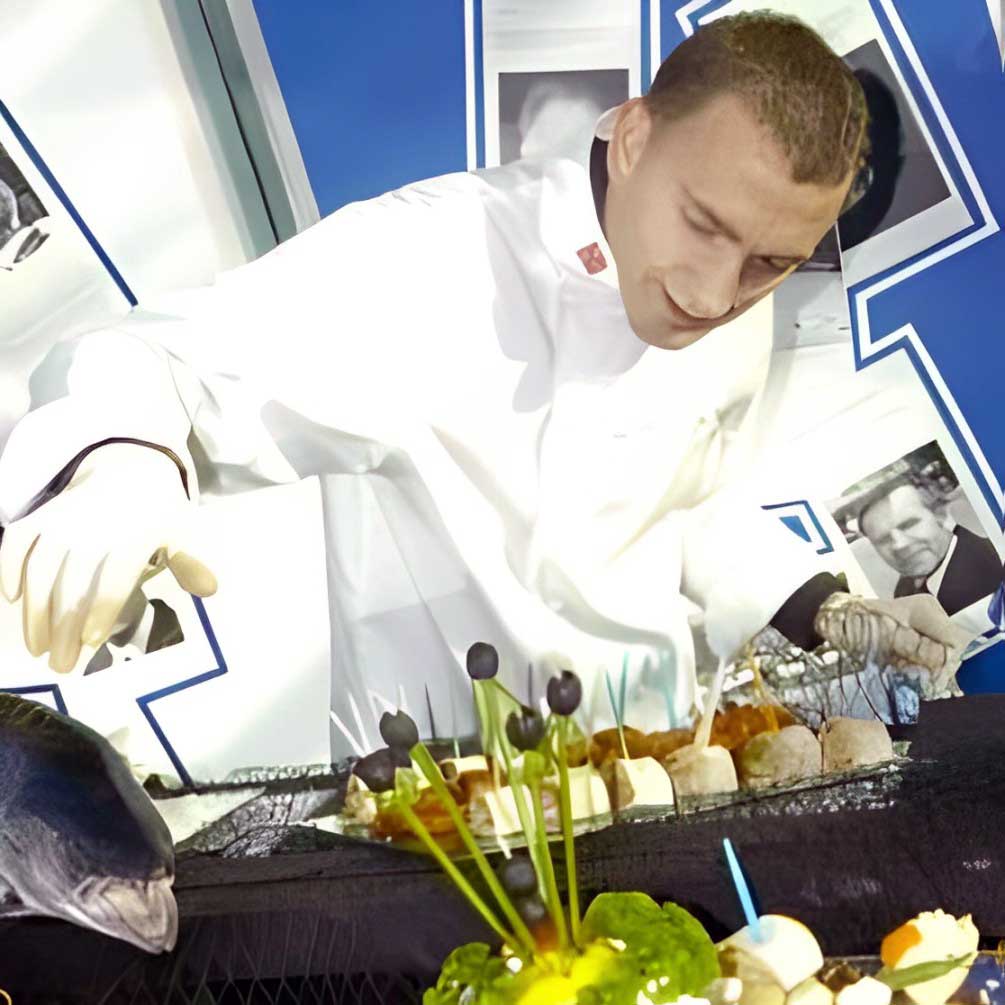
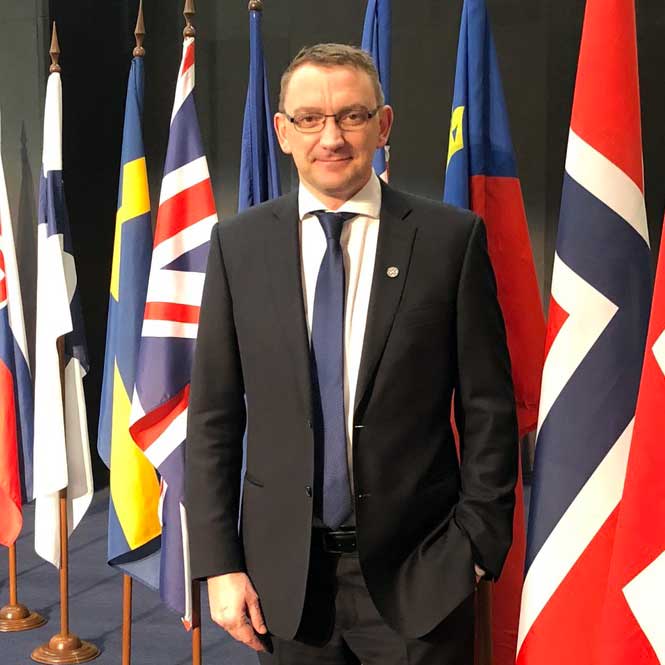
DIVERSE BACKGROUND: Angelvik in the role of chef during the opening of Ægirsalen in Hitra in 2006, and as State Secretary during the EU summit in Sofia in 2018.
Photo: Private

